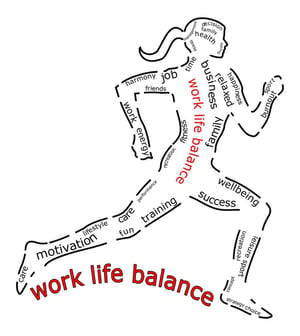MAKE A SPLASH
THIS SUMMER

Join Now For $0 Enrollment!
Learn MorePosted By: Chicago Athletic Clubs /
For some of us, fitness is a way of life. For others, working out is just another of so many things we are trying to accomplish on a given day. Regardless, physical activity plays an intensely important role in our life, and the health of our mind and our mood.
Whether you are a fitness freak or freaking out about something else, knowing what part your workout plays in helping your mind can be a major factor in improving your overall well-being. We take the advice and expertise of Hayley Perelman - former competitive swimmer, now Ph.D. candidate in clinical psychology - and dissect the power and effects of sports training on your mental health.
 The team mentality
The team mentalityThe physical benefits of working out are widespread and well-recognized. For the body, regular exercise helps to regulate weight, strengthen muscle and bone, improve oxygen efficiency in the body and maintain an overall higher quality of life on a physically interactive level.
On a physiological level, cardiovascular exercise releases endorphins - neurotransmitters existing in our brains that are related to a mood boost - prompting a feeling of euphoria for many after a good workout.
Additionally, many people use exercise as a form of stress relief. Exercise guards us from stress because it results in a lower heart rate, and thus lowers our heart rate response to psychological stress. Cardio exercise is also a protective factor against other physical health concerns, such as heart disease.
Aside from the purely physiological data, however, there are some very important contributions that physical activity, and sport training in particular, make to our overall well being and quality of life. Hayley Perelman began swimming on a year-round team at age 7, and ultimately attended the University of Vermont's Division-I NCAA program where she specialized in the individual medley and butterfly.
For her, swimming was something she always loved doing. “I just wanted to be in the water,” she says. “I came from an athletic family that valued sports, and I enjoyed the team aspect.”
Group sports provide a built-in community for their team members. With this community comes team support, a social outlet and a greater purpose of working towards a group goal. It allows its members to build confidence through sportsmanship and friendship.
In fact, research shows that simply being part of a team reduces depression and anxiety because of the social support a team provides. In these current days of digital dominance, this person-to-person interaction and stimulation become even more critical as a means by which to balance the effects of isolation and overwork.
If you’re not into intramural sports, however, the gym is a great alternative as a social outlet. “Make it a community thing,” says Perelman. “Go with a friend or meet with a trainer.” Group fitness classes are a fun and social way to feel part of group and get a similar kind of social stimulation. Some gyms even offer team training groups, like the Masters Swim Team at Chicago Athletic Clubs.
Perelman has been a part of the CAC Master Swim team for about two years. “You really feel the support of a team. Participants are a mix of competitive and non-competitive swimmers, and coaches give everyone equal time, regardless of level.”
 Self-care starts with you
Self-care starts with youNo matter what your workout regimen is, the most important thing to prioritize is life balance. For many of us, physical activity and workouts can be a central pillar of our self-care, in ways far beyond the physical benefits it provides.
“It’s about intentionally carving out the time to do something healthy for yourself, even if it’s just going for a walk,” explains Perelman. “It’s about leaving work at work.” This personal time is often the first thing we are willing to drop when we get stressed.
Perelman says this is when it’s even more crucial to prioritize personal time. “My college swim coach had a sign at the entrance of the pool that read ‘Check your baggage here.’ It was his way of reminding us that swim practice was about swim practice and to leave all other life concerns out of the pool.
I try to remember that now for my work outs!” For Perelman, as for many former competitive athletes, transitioning from a highly regimented workout schedule to having to manage and fit in workouts around the rest of life was a real challenge, a challenge familiar to many of us.
“The dedicated autonomy of working out for yourself and motivating yourself with no coach is a huge confidence builder. I’ve really grown to love the autonomy piece,” she says, “the idea that it’s your hour.” This mindfulness of activity for yourself is at the same time both grounding and invigorating.
Balance, of course, cuts both ways, an important thing to remember in these times of Go! Go! Go! Gotta get stuff done! “Honor those occasional times when you don’t want to do anything, don’t push through on a day when you are really not feeling it.”
Perelman admits this isn’t easy. For former athletes, this can be especially difficult when sports training has conditioned them that pushing through everything makes you a better athlete. “You have to learn to measure it for yourself.
By listening to your body and being honest you can begin to determine when you are pushing yourself too hard versus when you are feeling complacent”. Overall, it’s about learning to gauge when you need to come first.
Physical activity can also be corrective in times when we are feeling particularly anxious, depressed or isolated. Simply starting an activity - social or physical ‘behavioral activation’ - helps to activate and engage you when you are feeling down.
“Distraction helps with negative emotion,” says Perelman. “It actually decreases the experience of physical pain by altering pain circuitry in the brain.” This can be as simple as going for a mindful walk or as social as joining a club soccer league. The most important component is to just start moving your body, and your mind will follow.
 Exercise as risk factor vs. protective factor
Exercise as risk factor vs. protective factorIt is important to be conscious of when too much is too much. Hayley Perelman is currently working towards a specialization in disordered eating and body image, particularly in the athlete population. She began seeing the negative effects of sports training in her teammates. “Swimming is a ‘lean-promoting sport',” she explains.
“A sport where weight and shape contribute to performance, and this can lead to unhealthy eating habits.” Her current research interests focus on eating pathology and body dissatisfaction in college athletes, but this is an issue that clearly expands outside of the athlete population.
For former athletes transitioning from daily training to everyday life, they often desire a change in their eating habits. As former athletes tend to expend much less energy upon retirement from competitive sport, they may also look to change their energy (food) intake. For many people, former athletes or not, compulsive exercising is a very real issue.
Perelman mentions that a possible “symptom” of excessive exercise is feeling extreme anxiety at the thought of missing a workout to go to a happy hour with your friend, or canceling social plans because you can’t miss a workout. This would signal that it is time to re-examine your motivations. You may be actively isolating yourself through exercise.
“Mental health has to do with overall flexibility and balance. If you find that your exercise habits are extremely rigid , then examine the function of exercise for you. What is it reducing? For example, is this your only way of modifying anxiety? You may consider trying meditation, or talking to a licensed psychologist or other mental health professional.”
Most prevalent in Perelman’s research, and also in our collective cultural mind, is the over-evaluation of body shape and weight. Body dissatisfaction is fairly common across both genders, and daily marketing and entertainment practices ensure that it stays forefront in our awareness.
However, as Perelman discusses, the answer is often about both challenging your thoughts and expanding your awareness of what is really out there. “Behavioral experiments help to guide you away from over-concern by simply looking around and observing.”
What is a behavioral experiment that you could try? One is, when you’re out on the street, intentionally focus on every third person you see around you and objectively observe their shape. This helps to train our awareness that humans come in very different shapes and weights and sizes, and that doesn’t have any impact on their inherent value .
“Don’t just choose random people to look at. Purposefully count every third person to focus on,” Perelman advises. “We are so automatically trained to look at what society would consider fit or beautiful that it becomes all we look for..”
And what if you’re using exercise and community building to combat depression, and are still feeling crappy? Think of it as an adjunct to therapy, or vice versa and check out both. Perelman advocates that it is 100% ok to see a psychologist. This does not mean something is wrong with you! “Mental health is coming to forefront of our awareness, letting us know that a lot of people experience negative thoughts and feelings at points in their life.”
Michael Phelps made a huge impact on awareness by openly discussing his experience with depression and anxiety. Mental health professionals are there to help and are available to anyone. How best to find one? “Call your insurance to see what licensed providers are in your network,” recommends Perelman.
“You can ask for a specialist if you know there is something specific you want to work on.” Googling is OK, or if you have a friend in the field, it’s totally appropriate to text them and ask for a recommendation. It can be vulnerable, and you want to find the right fit for you. If you go a couple times to one therapist and it doesn’t feel like you mesh, it’s ok to switch.
As Hayley is fond of saying, “You can’t out-think your emotions.” But with mindfulness and intention, we can allow our bodies to help us feel better, physically and mentally. You are the one in charge of your self-care, make it a priority. You won’t get far without it.
 Hayley is a Ph.D. candidate in clinical psychology. She is working towards a specialization in disordered eating and body image, particularly in the athlete population.
Hayley is a Ph.D. candidate in clinical psychology. She is working towards a specialization in disordered eating and body image, particularly in the athlete population.
| Alex Card
| Chicago Athletic Clubs
| Chicago Athletic Clubs
| Chicago Athletic Clubs
| Chicago Athletic Clubs
© 2026 Chicago Athletic Clubs. All Rights Reserved. Privacy PolicyEmployee Login
https://www.chicagoathleticclubs.com/
https://www.chicagoathleticclubs.com/services/personal-training/
0
5000
true